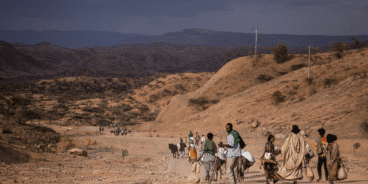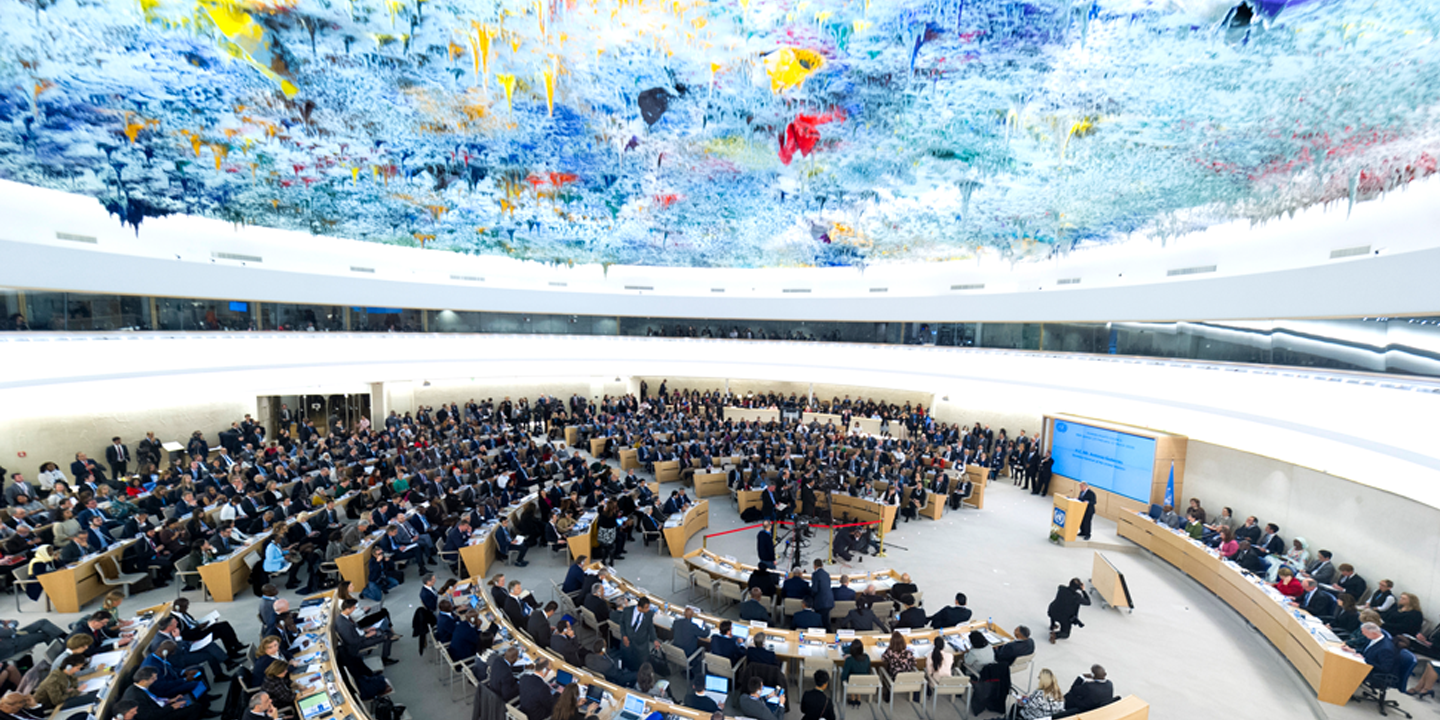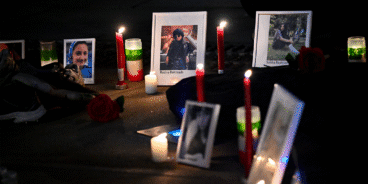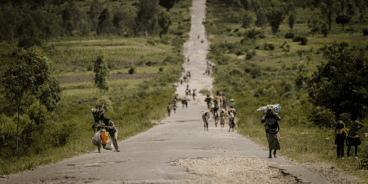

Recommendations for the 47th Session of the Universal Periodic Review
Your Excellency,
The Global Centre for the Responsibility to Protect is writing to you regarding the 47th session of the Universal Periodic Review (UPR) of the UN Human Rights Council (HRC) in Geneva.
In 2005 heads of state and government unanimously agreed on the responsibility of states to protect populations from genocide, war crimes, crimes against humanity and ethnic cleansing. Under the Responsibility to Protect (R2P), it is the primary responsibility of each individual state to protect their own population and the responsibility of the international community to assist them in doing so. The UPR can play an important role in assessing each country’s institutional preparedness to protect human rights and prevent mass atrocities. During the 47th session of the UPR working group, the Global Centre would therefore like to respectfully encourage you to provide all states that are under review with the following recommendations, where applicable:
-
-
- Expeditiously appoint an R2P Focal Point – a senior government official responsible for the promotion of mass atrocity prevention at the national, regional and international level;
- Sign, ratify and implement the core instruments of International Human Rights Law (IHRL) and International Humanitarian Law (IHL), including the Convention on the Prevention and Punishment of the Crime of Genocide, Additional Protocols I and II to the 1949 Geneva Conventions, Rome Statute of the International Criminal Court (ICC), Convention relating to the Status of Refugees and its 1967 Protocol, Arms Trade Treaty and 1954 Convention for the Protection of Cultural Property in the Event of Armed Conflict;
- In keeping with R2P’s Pillar II, request support from other states, as well as regional and international organizations, when atrocity risks exist that cannot be addressed by your state alone;
- Ensure that all national security forces respect human rights and IHL and fulfill their responsibility to protect all populations within the territory of your state, regardless of race, gender, nationality, ethnicity, religion, sexual orientation or any other status;
- Support accountability for atrocity crimes and all relevant institutions of international justice;
- Issue open invitations to HRC-mandated Special Procedures and fully cooperate with all other HRC mechanisms and procedures;
- Protect human rights defenders and the media, as well as the rights of civil society to operate freely, safely and independently;
- Consult and utilize the Framework for Action for the Responsibility to Protect to assess gaps and identify opportunities to address national atrocity risks.
-
In addition to these general recommendations, we respectfully ask you to consider the tailored recommendations provided below for the Democratic People’s Republic of Korea, Democratic Republic of the Congo, Ethiopia and Nicaragua.
Democratic People’s Republic of Korea
In a landmark report issued in February 2014, the HRC-mandated Commission of Inquiry (CoI) on human rights in the Democratic People’s Republic of Korea (DPRK) established responsibility at the highest level of government for ongoing crimes against humanity, as well as other systematic and widespread human rights violations, including extermination, murder, enslavement, torture, imprisonment, rape, forced abortions and other forms of sexual violence, persecution on political, religious, racial and gender grounds, forcible transfer of populations, enforced disappearance of persons and the inhumane act of knowingly causing prolonged starvation. Many of these abuses remain ongoing.
Women and children in the DPRK face severe risks due to widespread malnutrition, systemic gender-based discrimination and pervasive violence, including sexual and domestic violence. Both women and children also face various and distinct forms of coercion and exploitation through the DPRK’s campaign of forced labor, which conscripts labor from schools and youth organizations, as well as the Women’s Unions, among others.
On 16 July the Office of the UN High Commissioner for Human Rights (OHCHR) published a new report, concluding that forced labor is institutionalized in the DPRK and may constitute the crime against humanity of enslavement. During the UN Security Council (UNSC) open briefing on the human rights situation in the DPRK on 12 June, several states highlighted how North Korea’s use of forced labor and commission of other human rights violations have serious implications for international peace and security, including enabling the DPRK to advance its unlawful nuclear and missile development programs.
For decades the DPRK government has attempted to insulate itself from international engagement and scrutiny. The government has refused to cooperate with international human rights mechanisms and offices, including the OHCHR office in Seoul and the UN Special Rapporteur on the situation of human rights in the DPRK. Prolonged isolationist measures and the alleged diversion of aid have severely restricted access to food, medicine, healthcare and livelihoods. This has been exacerbated by the DPRK further entrenching its policy of isolation, closing international borders and enforcing repressive and unnecessary restrictions on basic freedoms since 2020 under the pretext of preventing the spread of COVID-19.
The Global Centre therefore urges you to include the following recommendations to the Democratic People’s Republic of Korea during the UPR session on 7 November:
-
-
- Fully implement the recommendations of the CoI, including dismantling all political prison camps, releasing political prisoners and clarifying the fate and whereabouts of all missing and disappeared persons;
- Repeal the Reactionary Thought and Culture Rejection Law, the Youth Education Guarantee Law and the Pyongyang Cultural Language Protection Act, and create conditions conducive for freedom of expression, including by taking practical measures to ensure citizens’ rights to free access to information;
- Fulfill treaty obligations under the Convention on the Elimination of All Forms of Discrimination against Women and the Convention on the Rights of the Child, and eradicate discriminatory laws, regulations and practices affecting women and children;
- Guarantee the right to freedom of movement, including the right to leave one’s country, and ensure that those who are forcibly returned are not subjected to punishment;
- Prohibit and effectively end exploitative practices that prioritize the development of illicit nuclear weapons and ballistic missile programs over the welfare of the population, including the widespread use of forced labor and the diversion of resources.
-
The Global Centre further respectfully encourages you to consider the following advanced question for the review of the Democratic People’s Republic of Korea:
-
-
- During the last UPR cycle, the DPRK government accepted a recommendation to comprehensively review national legislation to strengthen the legal framework for the promotion and protection of human rights as required by the international human rights treaties to which it is a party. What progress has been made toward strengthening and upholding domestic human rights legislation?
-
Democratic Republic of the Congo
For nearly 30 years, recurrent attacks by armed groups in the eastern provinces of the Democratic Republic of the Congo (DRC) have escalated despite government and regional military efforts. Armed groups like the March 23 Movement (M23), Allied Democratic Forces, Cooperative for the Development of Congo and various Maï-Maï and Nyatura factions continue to regularly perpetrate widespread violations that may amount to crimes against humanity and war crimes.
Between October 2023 and March 2024 alone, the UN Joint Human Rights Office (UNJHRO) in the DRC documented 2,110 human rights violations and abuses, 59 percent of which were perpetrated by armed groups. These include summary executions and conflict-related sexual violence. Moreover, between January 2023 and March 2024 at least 1,533 civilians were killed, 469 injured and 712 kidnapped. During military operations, some members of the government’s armed forces (FARDC) have also been implicated in violations and abuses that may amount to war crimes and crimes against humanity. The government has also integrated armed group members who have been implicated in past crimes into the FARDC, encouraging impunity and heightening risks to civilians.
The security situation in the eastern provinces, particularly in North Kivu and Ituri, has continued to deteriorate amid recurrent armed group activity and attacks, posing significant threats to populations. In North Kivu, intense fighting between M23 and the FARDC, who are supported by local militias, has been marked by heavy artillery, shelling and bombings in populated areas. The UNSC-mandated Panel of Experts has provided evidence of Rwanda’s “de facto” control over M23 operations. The renewed offensive has aggravated tensions with neighboring states, prompting several UN officials to warn about the potential for a regional conflict, and has provoked an increase in hate speech and incitement to discrimination. Myriad other armed groups continue to target populations in North Kivu and Ituri, where attacks against civilians and civilian property, as well as kidnappings, occur on a near-daily basis. Meanwhile, the accelerated withdrawal of the UN peacekeeping mission (MONUSCO), at the request of the Congolese government, raises critical concerns regarding the future of civilian protection. The withdrawal of MONUSCO from South Kivu has already exacerbated an existing security and protection vacuum, particularly as armed groups are remobilizing, and thousands of civilians are fleeing to the province amid relentless attacks in neighboring North Kivu.
The Global Centre therefore urges you to include the following recommendations to the Democratic Republic of the Congo during the UPR session on 5 November:
-
-
- Ensure law enforcement officials and the FARDC strictly adhere to obligations under IHL and IHRL during their operations and take steps to prevent, investigate and publicly report on violations and abuses to combat impunity;
- Strengthen national and regional judicial institutions, including human rights bodies such as the Human Rights Liaison Unit and the National Human Rights Commission, to hold perpetrators of alleged war crimes and crimes against humanity accountable and to identify early warning signs of mass atrocities;
- Continue to cooperate with the ICC’s investigation into alleged war crimes and crimes against humanity committed in the DRC since 2002, and promote an inclusive process of transitional justice in areas affected by recent atrocities, such as in North Kivu, South Kivu and Ituri, to establish the truth, address root causes of conflict and provide redress to victims and survivors;
- Strengthen the cooperation of the government, including at the provincial level, with UNJHRO and OHCHR, as well as civil society organizations working in conflict-affected areas, particularly as MONUSCO draws down;
- Restore state authority and maintain a protective environment in areas previously secured by MONUSCO to prevent a resurgence of violence by armed groups, including through enhancing community engagement with civilians and strengthening mechanisms for the unarmed protection of civilians;
- Allocate financial resources to support capacity-building activities for civil and military authorities in human rights protection.
-
The Global Centre further respectfully encourages you to consider the following advanced question for the review of the Democratic Republic of the Congo:
-
-
- What steps has the government taken to implement the transitional justice strategy and bolster civilian protection and early warning mechanisms as MONUSCO disengages?
-
Ethiopia
Long-standing grievances and recurrent human rights abuses by government forces and armed groups in Ethiopia have caused multiple conflicts to flare since Prime Minister Abiy Ahmed rose to power in 2018. Hundreds of thousands of civilians have been killed, particularly in the Amhara, Oromia and Tigray regions, and 4.5 million people continue to be displaced. Inter-communal and inter-religious violence, as well as regional border disputes in other parts of Ethiopia, also continue. These conflicts – coupled with climate-related fragility – have driven a massive humanitarian crisis, leaving 21 million people in need of assistance.
Since 2018 conflict between Oromia regional security forces, the Ethiopian National Defense Forces (ENDF) and the Oromo Liberation Army (OLA) armed group have killed thousands of civilians in what may amount to war crimes and crimes against humanity. Government forces continue to commit enforced disappearances and attacks on civilians, including through repeated air and drone strikes and extrajudicial executions of perceived OLA supporters. The OLA, which seeks autonomy for ethnic Oromos, has targeted ethnic Amharas living in Oromia and border areas.
From November 2020 – 2022 the ENDF and its allies, including the Eritrean Defense Forces (EDF), fought in an armed conflict with the Tigray Defense Forces. The fighting began in the Tigray region and subsequently spread to the neighboring Afar and Amhara regions in July 2021. War crimes and/or crimes against humanity were committed by all parties to the conflict, with several UN bodies, including the International Commission of Human Rights Experts on Ethiopia, and international human rights groups documenting indiscriminate bombings, ethnic-based killings, sexual violence, forced displacement, destruction of cultural heritage and systematic destruction of food, water and health infrastructure. Amnesty International and Human Rights Watch found that Amhara regional forces and militia, including the Fano, an ethnic Amhara militia, and the EDF were responsible for the ethnic cleansing of Tigrayans from Western Tigray, with ENDF complicity. Despite the signing of a cessation of hostilities agreement on 2 November 2022 between the federal government and the regional governing Tigray People’s Liberation Front, abuses by the EDF and Fano have continued in Tigray, including sexual violence and extrajudicial killings of civilians.
In April 2023 the federal government announced plans to integrate regional militia forces into the federal army and police, prompting fears of a loss of regional autonomy and vulnerability to attacks by armed groups. Protests against the measure in Amhara led to intense clashes between the Fano and ENDF. The UN and international human rights groups have documented arbitrary arrests and drone strikes targeting civilian areas by both parties to the conflict, while ENDF forces have killed civilians during searches for Fano and systematically targeted health facilities, workers and patients.
On 14 June OHCHR released an update, determining that government forces, EDF and myriad militias killed at least 1,351 civilians from January 2023 to January 2024. The report found that between 4 August and 31 December 2023 drone strikes killed at least 248 civilians and destroyed civilian infrastructure, including schools and hospitals, in Amhara and Oromia.
The Global Centre therefore urges you to include the following recommendations to Ethiopia during the UPR session on 12 November:
-
-
- Uphold IHL and IHRL by ending attacks against civilians and civilian infrastructure, including actions that amount to atrocity crimes as a matter of accepted conduct by security forces;
- Commit to resolving ongoing conflicts, including those in Amhara and Oromia, through dialogue and mediation with all stakeholders;
- Conduct prompt, independent investigations and preserve evidence related to allegations of mass atrocity crimes, as well as alleged abuses that may constitute war crimes and crimes against humanity in the Tigray, Amhara and Oromia regions, and ensure that perpetrators are brought to justice through transparent and impartial processes;
- Allow independent investigators and human rights organizations to carry out immediate, impartial and thorough documentation of human rights violations and abuses;
- Further strengthen cooperation with UN human rights mechanisms, including by extending a standing invitation to all HRC Special Procedures;
- Ratify the Rome Statute of the ICC and implement the Treaty within domestic legislation, including by incorporating provisions to investigate and prosecute mass atrocity crimes in accordance with international law.
-
The Global Centre further respectfully encourages you to consider the following advanced question for the review of Ethiopia:
-
-
- Given the lack of implementation of supported recommendations from the last UPR cycle, how does the government plan to measure progress on safeguarding human rights protections for all Ethiopians and to ensure progress on justice and accountability for war crimes, crimes against humanity and ethnic cleansing?
-
Nicaragua
Since 2018 Nicaragua has experienced an unprecedented human rights crisis. Under President Daniel Ortega, the government has engaged in a broad campaign of repressing dissenting or independent voices, including human rights defenders, women’s rights groups, journalists, community leaders, Indigenous Peoples, students and academics, business owners, political opponents and the Catholic Church. The HRC-mandated Group of Human Rights Experts on Nicaragua (GHREN) has reported that the government, as well as pro-government groups, have committed crimes against humanity as part of a systematic campaign to eliminate any opposition.
Ongoing crimes against humanity have been facilitated in part by the deliberate dismantling of democratic institutions and safeguards since President Ortega took office in 2007, and escalated in the context of a violent crackdown on street protests in April 2018. The GHREN has warned that since then, violations, abuses and crimes are committed to dismantle opposition efforts, as well as to discourage any new social mobilization. This has also been exemplified by the systematic crackdown on civic space, which has resulted in the forced shutdown of non-governmental organizations (NGOs) and independent media outlets and the prosecution of independent journalists on charges of hate crimes and terrorism. Since December 2018 more than 5,000 NGOs have been forcibly shutdown, including 1,500 on 19 August 2024 alone. This mass shutdown constituted the largest attack against civic and religious groups in a single day. President Ortega and his wife, Vice President Rosario Murillo, have also dismantled checks and balances and instrumentalized the country’s executive, judicial, legislative and electoral branches. Repression also expands beyond the country’s border, including through the deprivation of nationality, forced deportations and the prohibition of family reunifications.
In a report dated 28 February 2024, the GHREN warned that the situation has continued to deteriorate over the past year as patterns of repression have expanded toward all segments of society. According to the experts, “as the Government has neared its goal of total destruction of critical voices in Nicaragua…there has been an exponential increase of patterns of violations focusing on incapacitating any kind of opposition in the long term.” The GHREN previously warned that patterns of attacks against universities, students and professors may constitute the crime against humanity of persecution on political grounds. To date, the government refuses to cooperate and grant access to the GHREN.
The Global Centre therefore urges you to include the following recommendations to Nicaragua during the UPR session on 13 November:
-
-
- Immediately halt the systematic persecution of actual or alleged opponents and release all arbitrarily detained individuals;
- Allow independent media and civil society organizations to operate safely and freely;
- Commit to full and meaningful cooperation with regional and international human rights monitoring mechanisms, including OHCHR and the GHREN, and grant full and unfettered access to the GHREN to all parts of Nicaraguan territory;
- Ensure thorough, independent and transparent investigations into systematic human rights violations and abuses, including those documented by the GHREN, to hold those responsible to account, regardless of their political status or position;
- Implement previous recommendations outlined by the GHREN, including measures to implement legislative and public policy measures in order to guarantee democratic principles and the separation of the executive, legislative, electoral and judicial branches of the government.
-
The Global Centre further respectfully encourages you to consider the following advanced questions for the review of Nicaragua:
-
-
- Which steps has the government taken to investigate, ensure accountability for and prevent recurrence of crimes against humanity, as documented by the GHREN?
- Will the government commit to granting full and unhindered access to the GHREN to the territory of Nicaragua, to allow investigators and their team to implement their mandate in accordance with Resolution 52/2?
-
Related Content


Atrocity Alert No. 468: Iran, Ethiopia and Afghanistan
